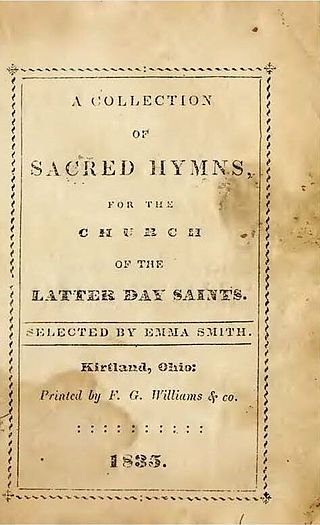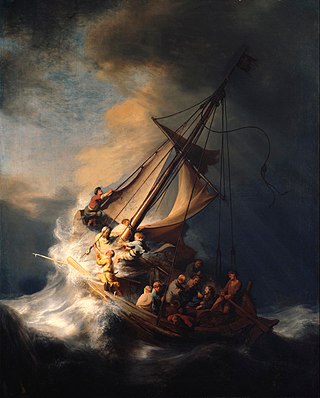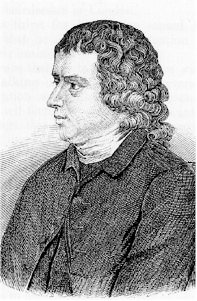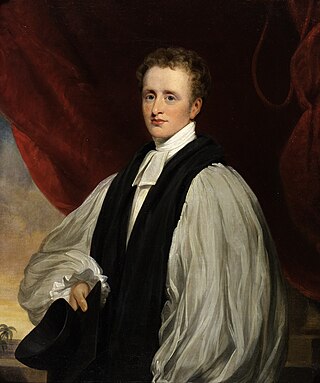The Finlandia hymn refers to a serene hymn-like section of the patriotic symphonic poem Finlandia, written in 1899 and 1900 by the Finnish composer Jean Sibelius. It was later re-worked by the composer into a stand-alone piece. With words written in 1940 by Veikko Antero Koskenniemi, it is one of the most important national songs of Finland. Although not the official national anthem of Finland, it has been continuously proposed as such.

"Love Divine, All Loves Excelling" is a Christian hymn by Charles Wesley on Christian perfection. Judging by general repute, it is among Wesley's finest: "justly famous and beloved, better known than almost any other hymn of Charles Wesley." Judging by its distribution, it is also among his most successful: by the end of the 19th century, it is found in 15 of the 17 hymn books consulted by the authors of Lyric Studies. On a larger scale, it is found almost universally in general collections of the past century, including not only Methodist and Anglican hymn books and commercial and ecumenical collections, but also hymnals published by Reformed, Presbyterian, Baptist, Brethren, Seventh-day Adventist, Lutheran, Congregationalist, Pentecostal, and Roman Catholic traditions, among others including the Churches of Christ. Specifically, it appears in 1,328 of the North American hymnals indexed by the online Dictionary of North American Hymnology, comparable to Newton's "Amazing Grace" (1,036), Wesley's "O for a Thousand Tongues" (1,249), and Watts' "When I Survey the Wondrous Cross" (1,483), though still well short of Toplady's "Rock of Ages" (2,139) or Wesley's own "Jesu, Lover of my Soul" (2,164).

"Be Thou My Vision" is a traditional Christian hymn of Irish origin. The words are based on a Middle Irish poem that has traditionally been attributed to Dallán Forgaill.

Frances Ridley Havergal was an English religious poet and hymnwriter. Take My Life and Let it Be and Thy Life for Me are two of her best known hymns. She also wrote hymn melodies, religious tracts, and works for children. She did not occupy, and did not claim for herself, a prominent place as a poet, but she carved out a niche for herself.

"For All the Saints" was written as a processional hymn by William Walsham How, who was ultimately the Anglican Bishop of Wakefield. The hymn was first printed in Hymns for Saints' Days, and Other Hymns, by Earl Nelson, 1864.

A Collection of Sacred Hymns, for the Church of the Latter Day Saints. was the first hymnal of the Latter Day Saint movement. It was published in 1835 by the Church of the Latter Day Saints.

"Eternal Father, Strong to Save" is a British hymn traditionally associated with seafarers, particularly in the maritime armed services. Written in 1860, its author, William Whiting, was inspired by the dangers of the sea described in Psalm 107. It was popularised by the Royal Navy and the United States Navy in the late 19th century, and variations of it were soon adopted by many branches of the armed services in the United Kingdom and the United States. Services who have adapted the hymn include the Royal Marines, Royal Air Force, the British Army, the United States Coast Guard, United States Marine Corps and the United States Space Force, as well as the navies of many Commonwealth realms. Accordingly, it is known by many names, variously referred to as the Hymn of His Majesty's Armed Forces, the Royal Navy Hymn, the United States Navy Hymn, and sometimes by the last line of its first verse, "For Those in Peril on the Sea". The hymn has a long tradition in civilian maritime contexts as well, being regularly invoked by ship's chaplains and sung during services on ocean crossings.

A Christian child's prayer is Christian prayer recited primarily by children that is typically short, rhyming, or has a memorable tune. It is usually said before bedtime, to give thanks for a meal, or as a nursery rhyme. Many of these prayers are either quotes from the Bible, or set traditional texts.

"We Gather Together" is a Christian hymn of Dutch origin written in 1597 by Adrianus Valerius as "Wilt heden nu treden" to celebrate the Dutch victory over Spanish forces in the Battle of Turnhout. It was originally set to a Dutch folk tune. In the United States, it is popularly associated with Thanksgiving Day and is often sung at family meals and at religious services on that day.

"Come Thou Fount of Every Blessing" is a Christian hymn written by the pastor and hymnodist Robert Robinson, who penned the words in the year 1758 at the age of 22.
"For the Beauty of the Earth" is a Christian hymn by Folliott S. Pierpoint (1835-1917).

"Holy, Holy, Holy! Lord God Almighty!" is a Christian hymn written by the Anglican bishop Reginald Heber (1783–1826).
"How Great Thou Art" is a Christian hymn based on an original Swedish hymn entitled "O Store Gud" written in 1885 by Carl Boberg (1859–1940). The English version of the hymn and its title are a loose translation by the English missionary Stuart K. Hine from 1949. The hymn was popularised by George Beverly Shea and Cliff Barrows during Billy Graham's crusades. It was voted the British public's favourite hymn by BBC's Songs of Praise. "How Great Thou Art" was ranked second on a list of the favourite hymns of all time in a survey by Christianity Today magazine in 2001 and in a nationwide poll by Songs Of Praise in 2019.

Charlotte Elliott was an English poet, hymn writer, and editor. She is best known by two hymns, "Just As I Am" and "Thy will be done".
"Have Thine Own Way, Lord" is a Christian hymn with lyrics by Adelaide A. Pollard and music by George C. Stebbins. It was first published in 1907 in the "Northfield Hymnal with Alexander's Supplement". Later that year, it also appeared in two other popular hymnals, Ira Sankey's "Hallowed Hymns New and Old" and Sankey and Clement's "Best Endeavor Hymns".
"How Firm a Foundation" is a Christian hymn, published in 1787 by John Rippon in A Selection of Hymns from the Best Authors, Intended to be an Appendix to Dr. Watts's Psalms and Hymns, known as "Rippon's Selection." How Firm a Foundation is number 128 in the 1787 first printing. It is attributed only to "K", which probably refers to Robert Keen(e), precentor at Rippon's church, though other names suggested include Richard or John Keene, Kirkham, John Keith or Words by G. Keith and Music by J. Reading as cited in the 1884 publication of Asa Hull's Jewels of Praise. It is most often sung to the tune "Foundation" which first appeared in A Compilation of Genuine Church Music (1832) edited by Joseph Funk, though the original tune may be Keen(e)'s "Geard".
Edward Wilton Eddis was a poet and prophet in the Catholic Apostolic Church at Westminster, London and co-author of the Hymns for the Use of the Churches, the hymnal of the Catholic Apostolic Church.

"Allein Gott in der Höh sei Ehr" is an early Lutheran hymn, with text and melody attributed to Nikolaus Decius. With the reformers intending church service in German, it was intended as a German version of the Gloria part of the Latin mass, used in almost every service. Decius wrote three stanzas, probably in 1523, while a fourth was added, probably by Joachim Slüter.














